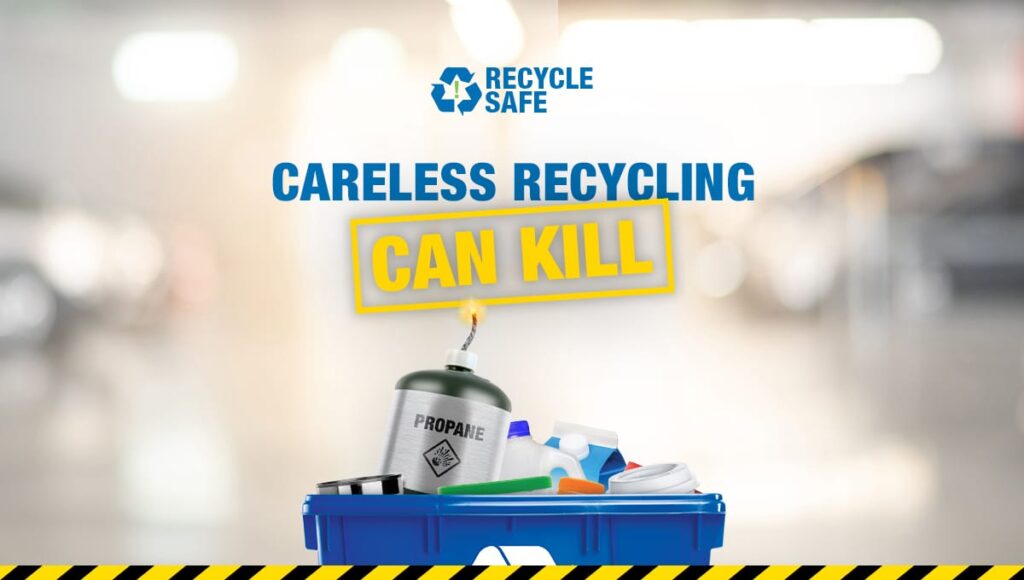Are you tossing your cell phone and laptop batteries into your blue bin? How about lighters, propane or butane canisters? If yes—then potentially—you are causing explosions and fires at material recovery facilities and in collection vehicles, endangering the lives of BC’s recycling collectors and processors.
Follow these expert tips to rethink what you recycle and where. Help keep recycling workers, facilities and the environment safe from not-accepted, hazardous materials.
1. Problem Materials
When incorrectly disposed of, there are lots of materials that can endanger the lives of collectors and processors, and cause damage or temporary closures to BC recycling facilities.
From items related to camping and outdoor living, like propane tanks for portable barbecues and camp stoves, to electronics including mobile devices, curbside recycling collection does not accept the following materials:
- Lithium-ion and household batteries
- Single-use propane and butane canisters
- Needles
- Flammable liquids
- Helium tanks
- Knives
- Flares
- Electronics
- Bear spray
- Ammunition
- Lighters
- Paint
2. Read Warning Labels
Hazardous materials should not only be kept out of recycling bins but also out of the waste stream as well. Always read the label. Any product left in packaging that contains corrosive, toxic, flammable, or reactive components can cause major problems at the recycling facility and are often labelled with hazard text/symbols: CAUTION, WARNING, CORROSIVE, EXPLOSIVE, FLAMMABLE, POISONOUS or TOXIC.
3. Be Aware of Not-accepted Materials
Be mindful of what you put in your recycling bins and ensure it’s an accepted material and 100% empty—not something that is potentially explosive and deadly. The risk for fires or explosions is especially high for material collection vehicles and receiving facilities due to significant amounts of paper, as well as the opportunity for the items to be compressed, causing explosions. The combination of easily flammable material, plenty of oxygen and large amounts of material where sparks can smolder undetected for lengthy periods, makes the presence of hazardous material especially precarious. View the materials accepted in your curbside recycling bin as part of our program.
4. Take Action—Change Your Behaviour
Be part of the solution to help prevent potential tragedies and ensure waste workers are not exposed to the risk of explosions or fires. Do not put hazardous materials in your recycling bins, your garbage cans, or down the drain/toilet. Don’t just assume because it’s recyclable that it belongs in a particular bin or that checking for a triangle symbol before tossing whatever it is in the blue bin is due diligence; it’s not. It only takes a few minutes to plan ahead to properly dispose of your hazardous waste.
5. Find a Location to Recycle or Dispose of Safely
When a material is not allowed in the curbside bin, it doesn’t mean it can’t be recycled somewhere else. Find a disposal location so problem items can be processed safely. Visit RecycleBC.ca/Hazardous to learn more and access the online depot search tool. You can also download the latest version of the free BC Recyclepedia App to search materials and find your closest recycling depot or contact the Recycling Hotline at 1-800-667-4321 or 604-RECYCLE (604-732-9253).


